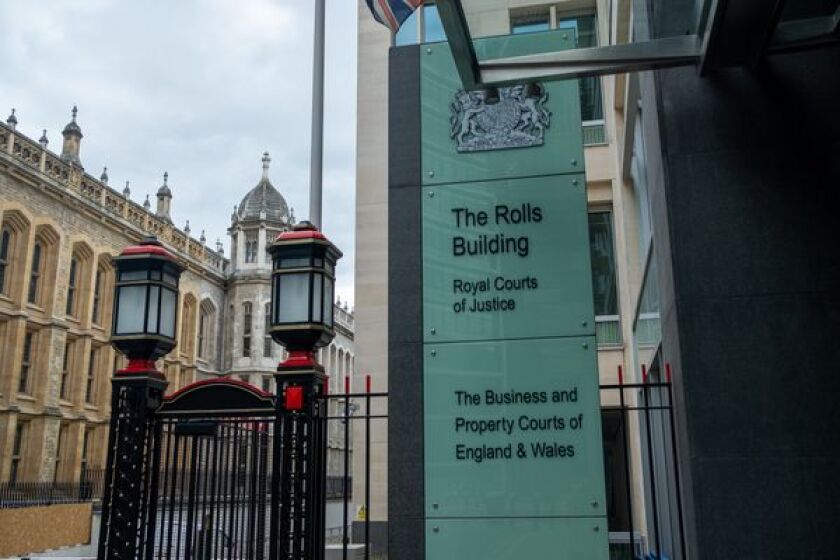Whilst it has long been the aim of the intellectual property industry to make the UK a more attractive place to litigate, and to make it more cost-effective for small businesses, it is my view that structurally that simply will not happen.
Who is to blame for this?
Barristers.
Let me unpick that slightly, as I do not mean it in a personal sense.
Whilst the aim of the judiciary has been to make IP litigation in the UK more affordable, the market forces have simply not followed the change.
The Intellectual Property Enterprise Court (IPEC), a division of the England and Wales High Court, has been a significant success, and it has been predicated on affordability and access.
Cost concerns
Issues of cost and speed remain, however. Whilst the IPEC has fixed cost caps for recovery, that is not to say that the cost of services has fallen to match the caps.
The IPEC proceeds on the basis that for a two-day trial, the maximum recoverable amount for preparing for and attending the trial itself will be £20,000 ($25,000). Many junior counsel will almost always exceed that, and the instructing lawyers will add even more.
A few years ago, I sought advice from the head clerk at one of the IP barrister sets and was advised that my rate for a trial was a third of what it should be. The rise in demand led by the success of the IPEC has caused a surge in pricing for barristers.
Of course, whilst cost risk is a significant factor for choosing to litigate (or not) and the IPEC’s cost caps have had great success in dealing with the issue, cost recoverability is at least as important. If counsel simply cannot be found at a reasonable cost (or at all) then the court cannot succeed.
Add to that the boom in patent work – particularly in the field of telecoms, electronics, and standard essential patents (SEPs) – and you have an IP bar that is stretched to the limits and where demand outstrips supply.
I have heard many tales that any IP counsel with even the slightest possibility of doing telecoms, electronics, or SEP work are being pulled into these patent cases.
In such a market, rates increase not just for patent work but also for all other work, and there is an inability to get counsel available for hearings. I have heard many stories of people finding it almost impossible to find appropriate counsel for other IP cases as they are all taken up on patent cases, and very junior counsel being used as sole counsel for trials when they would not have been in the past.
The IP bar has not increased its intake, instead intending to retain the quality of training (I don’t criticise that idea as if the quality is lost then the quality badge of counsel disappears).
Gold rush
It does, however, mean that there is a bottleneck of work and the most senior juniors and silks (a term given to senior barristers) are witnessing an unprecedented golden period of fees.
That issue of course trickles up to the judiciary.
Why would the most in-demand barristers – currently enjoying golden periods – contemplate stepping away and becoming permanent members of the judiciary.
Instead, we find the specialist IP judges pushed onto the technical cases and non-specialist judges pushed onto “soft” IP cases.
Sadly, as a current influx of cases to the Court of Appeal is showing, “soft” IP cases often include hard legal principles that are not easily understood by non-specialist judges.
Some answers could be to “nudge” parties to show even more of their hand early by making recovery of the cost of the initial pleadings higher (spurring parties to put more evidence in with their statements of case), increasing the amount recoverable at the case management conference (leading to more active case management and early consideration of issues early), and greater use of a requirement to engage in alternative dispute resolution (ADR).
By doing so the courts may hope to have more cases to be settled before trial. The changes in the fee caps at the IPEC seem to suggest this nudge is occurring insofar as they gave greater rises to the caps for some stages than others.
What else to do? The obvious answer is to increase the supply of advocacy, and for that to hopefully lead to an increase in the pool of candidates for the judiciary.
The IPEC has long been welcoming of solicitors and patent and trademark attorneys appearing, but quite frankly trial advocacy by patent and trademark attorneys has not taken off in the ten years since the IPEC was reconstituted as a specialist division.
Attorney advocacy
Advocacy at the UKIPO by trademark attorneys has not increased significantly, and I would suggest that until those figures increase it is unlikely that attorneys will take the leap to appear in originating proceedings.
Given the regularity of patent attorneys appearing in hearings at the EPO one might have expected them to lead the way, but except for a few there have been no patent attorneys appearing in the Court of Appeal or above.
On the trademark side, and as far as I am aware, only one trademark attorney has appeared in the Court of Appeal (the writer). A small handful have appeared in appeals to the High Court. More could appear.
Would an increase in advocacy from these professions fill the advocacy hole, but also the judiciary hole? Quite simply, no.
Trademark and patent attorneys are not entitled to sit as judges in the IPEC (the only judicial office available to them is that of an Appointed Person at the UKIPO).
Despite them potentially having the same rights of audience of barristers and solicitor advocates they are also precluded from ever applying for silk.
Although trademark and patent attorneys are “lawyers” within the meaning of the Legal Services Act, KC Appointments (and QC before that) are resolute in their rule that to be eligible to apply you can only be a solicitor or barrister.
The reasoning on both accounts appears to be the same: judges and silks may – in theory – be asked to deal with matters beyond just IP and (other than the exception that patent and trademark attorney litigators and advocates may deal with matters “ancillary” to the IP issues) they do not have rights of conduct or advocacy beyond IP issues.
This approach is not looked at similarly in other fields.
Fellows of the Chartered Institute of Legal Executives are entitled to sit as District Judges and Deputy District Judges without any right to appear or conduct cases before the High Court (or above).
The only other solution is to draw more candidates from the realms of the solicitor profession to be judges, and for them and patent and trademark attorneys to grasp the mettle and appear more often in the High Court.
Without this, it seems likely that the powers of supply and demand will push the fees of the IP bar ever higher, with greater problems still when it comes to the availability of counsel and specialist judges.











